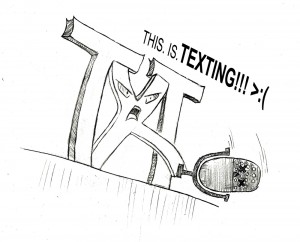
Voice mails are dying.
A mass transition from calling to text messaging means the voice message is losing its territory to the newer species of information exchange.
Remember voice mails? They are like audio post cards. They give you a chance to rant. This is something invaluable to the neurotics among us who do not need a living ear on the other end of the line to vent.
Voice messages are a chance to tell a story or a lie, make a joke, or prank somebody.
They are all different. They all come with a specific story, a particular set of circumstances that produced them. Text messages are not as memorable as voice mails because they are just that– text. A voice recording is more alive.
By eliminating the back and forth exchange of a normal flow of conversation the person leaving a voice mail has full liberty to be as weird as hell. The message beep, to the avid “voicemailist,” is like a track gun to a sprinter. The director between your ears says, “Action!” and the blank space is yours to fill.
I’m not talking about the professional messages you leave to potential employers or Craigslist sellers. Those are not as fun because there are too many rules to follow: names, numbers and planning get in the way.

I’m talking about personal messages that span the spectrum of experience that comes with being alive in the world.
There are the drunken chaos voice mail, the accidental butt-dial, the “I love you” cutesy couples message, the “Hey, how are you doing?” from parents. The list does not end.
A few friends of mine have had the misfortune of the unintentional leaked voicemail, the kind containing sounds not intended to leave the bedroom.
Nonetheless, if you have ever saved a voice mail you understand the appeal of goodness encapsulated in audio.
If you have read this far you may as well commit to a little participation. If you want voice mails to continue to be a thing, make it easy for people to leave them.
Set up your voice mailbox so there’s no “robot-voice” doing your dirty work. Callers do not want to wait for the automated voice to recite your digits in case they forgot what number they called.
Plus, your voice can remind people who you are– if they can’t get a hold of you at least they get to hear your voice, if only for a few seconds.
To illustrate the difference between voice messages and their textual counterparts let’s consider the following: imagine someone who just realized that they are in a hopeless situation where they will probably die. Now imagine that person is your family.
Would you want your last message from a loved one to be compressed into a hollow text?
All of a sudden things turned serious. Life is short. We should embrace the fullest potential, the most honest, meaningful forms of connection in our lives. Voice mails are not just more fun than texting, they are more real.
Kevin Crittenden can be reached at [email protected] or @theorion_news on Twitter.









